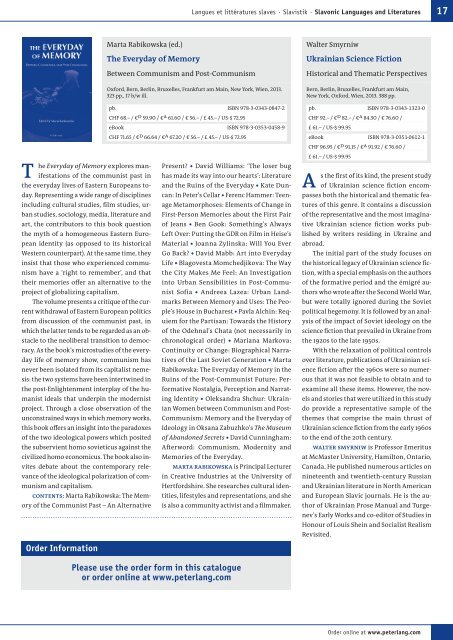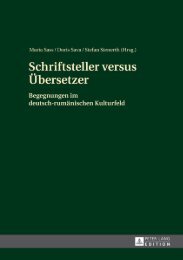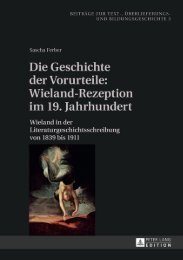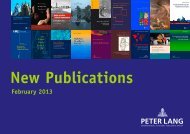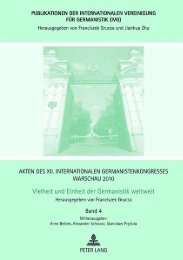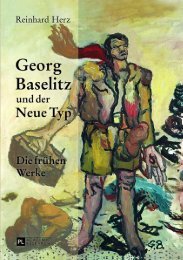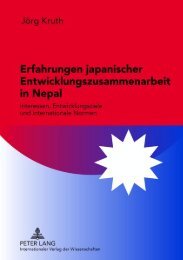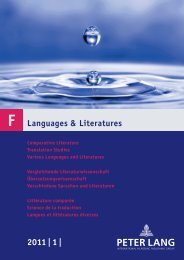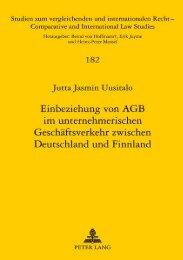Comparative Literature - Peter Lang
Comparative Literature - Peter Lang
Comparative Literature - Peter Lang
Create successful ePaper yourself
Turn your PDF publications into a flip-book with our unique Google optimized e-Paper software.
<strong>Lang</strong>ues et littératures slaves · Slavistik · Slavonic <strong>Lang</strong>uages and <strong>Literature</strong>s<br />
17<br />
T<br />
Marta Rabikowska (ed.)<br />
he Everyday of Memory explores manifestations<br />
of the communist past in<br />
the everyday lives of Eastern Europeans today.<br />
Representing a wide range of disciplines<br />
including cultural studies, film studies, urban<br />
studies, sociology, media, literature and<br />
art, the contributors to this book question<br />
the myth of a homogeneous Eastern European<br />
identity (as opposed to its historical<br />
Western counterpart). At the same time, they<br />
insist that those who experienced communism<br />
have a ‘right to remember’, and that<br />
their memories offer an alternative to the<br />
project of globalizing capitalism.<br />
The volume presents a critique of the current<br />
withdrawal of Eastern European politics<br />
from discussion of the communist past, in<br />
which the latter tends to be regarded as an obstacle<br />
to the neoliberal transition to democracy.<br />
As the book’s microstudies of the everyday<br />
life of memory show, communism has<br />
never been isolated from its capitalist nemesis:<br />
the two systems have been intertwined in<br />
the post-Enlightenment interplay of the humanist<br />
ideals that underpin the modernist<br />
project. Through a close observation of the<br />
unconstrained ways in which memory works,<br />
this book offers an insight into the paradoxes<br />
of the two ideological powers which posited<br />
the subservient homo sovieticus against the<br />
civilized homo economicus. The book also invites<br />
debate about the contemporary relevance<br />
of the ideological polarization of communism<br />
and capitalism.<br />
Contents: Marta Rabikowska: The Memory<br />
of the Communist Past – An Alternative<br />
Order Information<br />
The Everyday of Memory<br />
Between Communism and Post-Communism<br />
Oxford, Bern, Berlin, Bruxelles, Frankfurt am Main, New York, Wien, 2013.<br />
323 pp., 17 b/w ill.<br />
pb. ISBN 978-3-0343-0847-2<br />
CHF 68.– / € D 59.90 / € A 61.60 / € 56.– / £ 45.– / US-$ 72.95<br />
eBook ISBN 978-3-0353-0458-9<br />
CHF 71.65 / € D 66.64 / € A 67.20 / € 56.– / £ 45.– / US-$ 72.95<br />
Present? • David Williams: ‘The loser bug<br />
has made its way into our hearts’: <strong>Literature</strong><br />
and the Ruins of the Everyday • Kate Duncan:<br />
In <strong>Peter</strong>’s Cellar • Ferenc Hammer: Teenage<br />
Metamorphoses: Elements of Change in<br />
First-Person Memories about the First Pair<br />
of Jeans • Ben Gook: Something’s Always<br />
Left Over: Putting the GDR on Film in Heise’s<br />
Material • Joanna Zylinska: Will You Ever<br />
Go Back? • David Mabb: Art into Everyday<br />
Life • Blagovesta Momchedjikova: The Way<br />
the City Makes Me Feel: An Investigation<br />
into Urban Sensibilities in Post-Communist<br />
Sofia • Andreea Lazea: Urban Landmarks<br />
Between Memory and Uses: The People’s<br />
House in Bucharest • Pavla Alchin: Requiem<br />
for the Partisan: Towards the History<br />
of the Odehnal’s Chata (not necessarily in<br />
chronological order) • Mariana Markova:<br />
Continuity or Change: Biographical Narratives<br />
of the Last Soviet Generation • Marta<br />
Rabikowska: The Everyday of Memory in the<br />
Ruins of the Post-Communist Future: Performative<br />
Nostalgia, Perception and Narrating<br />
Identity • Oleksandra Shchur: Ukrainian<br />
Women between Communism and Post-<br />
Communism: Memory and the Everyday of<br />
Ideology in Oksana Zabuzhko’s The Museum<br />
of Abandoned Secrets • David Cunningham:<br />
Afterword: Communism, Modernity and<br />
Memories of the Everyday.<br />
Marta Rabikowska is Principal Lecturer<br />
in Creative Industries at the University of<br />
Hertfordshire. She researches cultural identities,<br />
lifestyles and representations, and she<br />
is also a community activist and a filmmaker.<br />
Walter Smyrniw<br />
Ukrainian Science Fiction<br />
Historical and Thematic Perspectives<br />
Bern, Berlin, Bruxelles, Frankfurt am Main,<br />
New York, Oxford, Wien, 2013. 388 pp.<br />
pb. ISBN 978-3-0343-1323-0<br />
CHF 92.– / € D 82.– / € A 84.30 / € 76.60 /<br />
£ 61.– / US-$ 99.95<br />
eBook ISBN 978-3-0351-0612-1<br />
CHF 96.95 / € D 91.15 / € A 91.92 / € 76.60 /<br />
£ 61.– / US-$ 99.95<br />
A<br />
s the first of its kind, the present study<br />
of Ukrainian science fiction encompasses<br />
both the historical and thematic features<br />
of this genre. It contains a discussion<br />
of the representative and the most imaginative<br />
Ukrainian science fiction works published<br />
by writers residing in Ukraine and<br />
abroad.<br />
The initial part of the study focuses on<br />
the historical legacy of Ukrainian science fiction,<br />
with a special emphasis on the authors<br />
of the formative period and the émigré authors<br />
who wrote after the Second World War,<br />
but were totally ignored during the Soviet<br />
political hegemony. It is followed by an analysis<br />
of the impact of Soviet ideology on the<br />
science fiction that prevailed in Ukraine from<br />
the 1920s to the late 1950s.<br />
With the relaxation of political controls<br />
over literature, publications of Ukrainian science<br />
fiction after the 1960s were so numerous<br />
that it was not feasible to obtain and to<br />
examine all these items. However, the novels<br />
and stories that were utilized in this study<br />
do provide a representative sample of the<br />
themes that comprise the main thrust of<br />
Ukrainian science fiction from the early 1960s<br />
to the end of the 20th century.<br />
Walter Smyrniw is Professor Emeritus<br />
at McMaster University, Hamilton, Ontario,<br />
Canada. He published numerous articles on<br />
nineteenth and twentieth-century Russian<br />
and Ukrainian literature in North American<br />
and European Slavic journals. He is the author<br />
of Ukrainian Prose Manual and Turgenev’s<br />
Early Works and co-editor of Studies in<br />
Honour of Louis Shein and Socialist Realism<br />
Revisited.<br />
Please use the order form in this catalogue<br />
or order online at www.peterlang.com<br />
Order online at www.peterlang.com


